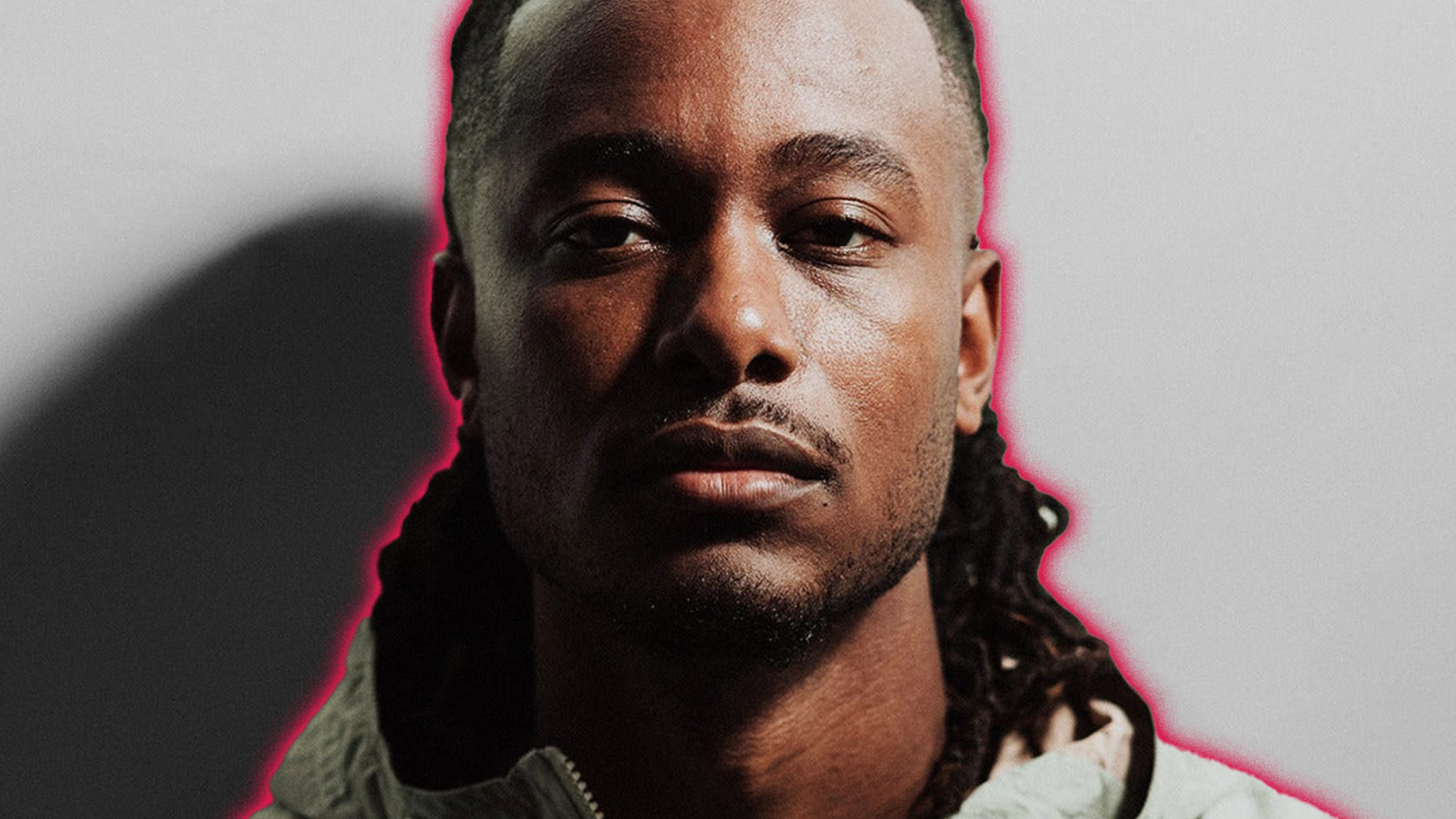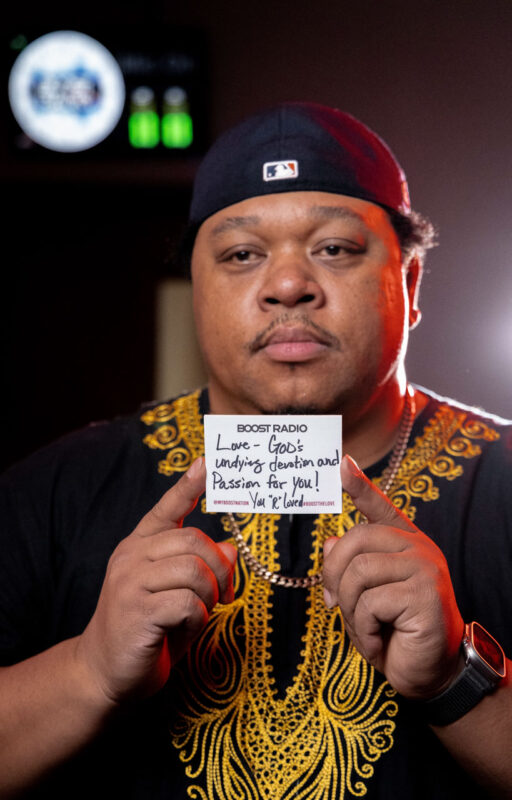We are living in a broken world. Whether it’s the loss of a loved one, a forced career change, inflation hitting all-time highs, and the worries of providing for your family. It’s easy to start to wonder where God’s at. Is He really leaving us high and dry? In this video, I’m sitting down with Christian rapper, KB, and we’re talking about when it’s appropriate or okay to ask the question “God, where you at?” AND the surprising truth about how in the midst of difficult times, Christians tend to respond dangerously wrong.
View this video with KB, and other interviews with BOOST artists videos on the BOOST Radio YouTube Channel.
JBo:
For those who are not believers and they look at devastating situations or they lose a loved one, or they lose a spouse or a child. The question is, even in those moments, where is God.
Because like you said, God is carved on our hearts. And if you don’t believe, we go back to where’s God in those moments.
KB:
Yeah. Absolutely. And that’s a fair question. So there’s a beautiful story. Everybody’s heard the story of Lazarus.
But man, we don’t really spend enough time reading the stuff before Lazarus walked out of the tomb. So Jesus is being, it’s a middle of a confrontation. So Lazarus’s family members are going to Jesus. And Jesus knows them. He’s friends with them. These are some of his best friends. And they confront him like, yo, where were you?
We’re supposed to be friends. We’re homies. Where were you? You’re out healing strangers. You heard that he was sick. Why did you not come immediately? You could have stopped this. The literal question is, where was God?
JBo:
And they knew God. So even to know him and have that question, and then you’re still going to have that question. The question is still, where is God? And that’s a valid question.
KB:
It’s a valid question.
JBo:
I think you shouldn’t be afraid or shy to ask that question as a believer.
Shouldn’t be afraid to ask that question because God is not afraid of those kind of questions.
KB:
Absolutely. He’s not. People say, man, I need you to be a big boy. He’s a big God. Okay?
I love that Jesus’ response is that all of this is for my glory and for your ultimate good even though it is impossible at times to see it. And he answers the questions with the resurrection of Lazarus. But here’s the thing. Lazarus dies again.
In fact, the very next chapter, the people that are looking to kill Jesus are looking for Lazarus too. They want him gone as well. I mean, we don’t know what happened after to Lazarus. But we know for sure he didn’t live forever. He died again.
JBo:
Yeah, he died again.
KB:
So what is this resurrection that you’re talking about? What’s the real story of the resurrection of Lazarus? It’s beyond the fact that he got out the grave. It’s that all of us who are in Christ are going to get out of the grave. That what happened with Lazarus is a precursor. It’s a taste, a sample of what all creation is going to go through. Everything will be made right. And God has these unique ways in which he reminds us of that as we walk with him, these little moments of light, little moments of resurrection, little moments of redemption, little moments of mercy that are saying, hey, glory in its fullness is coming.
JBo:
Amen. And you going to bug out when I say this, but whenever I read the story of Lazarus, I was like, dang, I wonder if Lazarus was like, bro, I died. I’m back. I’m dying again? I wonder if-
KB:
I got to go through this again?
JBo:
… Right. He was like, again? Like, God again?
KB:
Come on.
JBo:
This isn’t forever? I just think like that when I read the Bible. So when there’s natural disasters, right? But people lose their child, they lose spouses.
KB:
Yes. Yes. Have good friends that have lost children.
JBo:
And they’re going to ask in those difficult times. How do you navigate this with God? With natural disasters I feel you can, not chock it up, but you can say, okay, it’s mother nature. You know? But when it’s your child or your spouse, I feel like that’s another level of grief.
KB:
Absolutely. And I think careful people will tell you that in those situations, nobody has a word or a Bible verse or there’s no panacea for losing a child. In my estimation, that’s probably the worst, especially as a father. There’s not a whole lot that could happen to me, I don’t know if anything could happen to me that would be worse than having to bury one of my children. And again, in the moment I’m thinking about a friend of mine who buried his son. The grief is overwhelming. And you in that grief want to be reminded that God grieves with you. You also want to be reminded that the way that he grieves with you is that he also buried his son. And the way that we understand the burying of our sons is through what God did with Jesus. But I think the truth that means the most in these situations is not really theological at all.
It’s not me trying to make sense of it. I think it’s God has this unique way of sending people around you where he can love you through their service, their care. They’re listening, they’re weeping with you. And in that, I’ve seen healing begin to take root in a family. And after the healing begins through us just, not talking, not explaining, being present, loving, sitting, caring, I think it begins to open up the door to the promises of God. And I think about what Paul says in Romans 8, that the suffering of this present time, which he would definitely be talking about the death of a child, that the suffering of this present time, think about how terrible it is, that the glory that shall be revealed to us will make that suffering seem tiny.
He said, in comparison to the glory that is coming, something so complete, so comprehensive, so magnificent it will work backwards and take the pain that you feel that could not be compared to anything, and you will compare it to that glory and say that that pain was light and momentary. So those promises, I think they are sweet to my brothers and sisters that have suffered in that way when they’ve been able to lift their heads from the sorrow and look up to the promise.
JBo:
And that’s definitely an example how you said that God gives you people. A community around you. And that’s an example of being able to trust God in a difficult time.
Him showing you like, hey, I know you’re suffering, but I didn’t leave you. I didn’t forsake you. I didn’t leave you. I think where I see the insensitive sometimes is where we as believers will tell that to people who aren’t believers. And it’s like even believers as they’re grieving and suffering, have a hard time processing and believing that.
But then you’re telling that to an unbeliever. So how can we as believers be delicate to our friends and our family members who may not be believers?
KB:
Absolutely. I think it’s so crazy. The New Testament is filled with, I mean I’ll give Jesus’ ministry a couple categories, but there’s more than this, but at least two. One is preaching. So he is preaching and telling people stuff. A lot of that stuff didn’t make sense to the people he was talking to.
And he didn’t go out of his way to try to explain it. In fact, he was like, don’t explain it. Let them be confused. But the other thing he did, again, this is at least two categories, is that he just loved on people. He ate meals with them.
Nonbelievers. I just read this author, he in this book called A Meal With Jesus. He said that Jesus earned the title friend of sinners. He earned the title, friend of sinners.
JBo:
Wow. He earned a title.
KB:
He earned it by just loving them, sitting with them, healing them. He didn’t make them sign a form before he healed them. I’ll give you sight, but make sure that you read these disclosures. Do you love me? Do you know what I’m saying? Have you kept my word? You know what I’m saying?
No, he was involved in the miraculous work of neighborly love enemy love centering-
JBo:
Say that again though. You said enemy love.
KB:
Enemy love. Yes.
JBo:
Enemy love. Because we’re calling it love our enemies but-
KB:
And I have a book coming called Dangerous Jesus where we talk about this. But think about this enemy love thing. If I knew you had a need and you were desperate, hey, I need you to help me with this. And I went out of my way, swooped down and met that need. And after I’ve met this need for you, I say, I would like for you to do a couple things for me. They’re just some things that I would love for us to be in a relationship with. And you responded with, well, I really just wanted you for meeting my need. I don’t want anything to do with you. Right?
I would probably think this person is not going to be friends with me. We can’t be friends. You’d be categorized as an enemy from as far as I’m concerned. And it would be so discouraging that I respond to you and your need and you just emptied me of my person. You just wanted what I could do for you. People complain about this all the time online about their friend. This is what most people did to Jesus while he was on this earth. Most people wanted him, they’re called vampire people. They wanted Jesus for his blood.
JBo:
Suck you dry.
KB:
And what his blood can do. But they did not want him for his life.
JBo:
Whoa. Vampire people. They wanted Jesus for his blood and what his blood could do, but they didn’t want Him-
KB:
Shout out to Dallas Willard who came up with that analogy. And I really just believe that he did much for people who didn’t want nothing to do with him. And that’s what I’m trying to say. Is that in those situations, do not show up with your three point sermon. Be there to love them, to care for them. It is important. I feel like something happened. Plugging my book again. Danger Jesus.
JBo:
Dangerous Jesus.
KB:
I talk about this in the book, that something happened where it was more important that non-believers knew that we thought they were wrong in how they lived sexually, how they thought theologically. What I want for you is for you to know that I think you’re wrong. And that became what it meant to be a good Christian. But you don’t have any of that same energy of going out of your way that they would know that they are loved by you and cared by you.
And I think the Bible would teach, you got to flip that upside down.
What I want you to know is that you are cared for and loved and your differences are not an obstacle for my service. So I would lean into that.
JBo:
Because people’s differences were an obstacle for Jesus’s service.
And he is a savior of the world.
KB:
That’s right.
JBo:
They weren’t an obstacle.
KB:
Absolutely.
JBo:
So you mentioned Dangerous Jesus, your book that’s coming out.
KB:
Yes.
JBo:
And first of all, the book it says, was it fragile, compliant, irrelevant. All those words are crossed out. Dangerous Jesus.
KB:
Yes.
JBo:
And then it says, Why the only thing more risky than getting Jesus right is getting Jesus wrong.
KB:
That’s right. Yes.
JBo:
Can you talk about that a little bit?
KB:
So the book-
JBo:
That’s a lot without saying a lot.
KB:
Yeah, yeah. So I noticed in my study of history and just kind of going around the country, especially in America, that I started with an assumption.
I think that if people love Jesus, or excuse me, they say they love Jesus, but they don’t live like him. So they take this idea of following Jesus and they empty it from the life character in ways of Jesus. That those kind of people are actually worse off than those who don’t even know Jesus at all. That was an assumption. I felt like I was experiencing that as I was going around, especially in the political climate. It seems like extracting the gospel, a false gospel is worse than no gospel at all.
Frederick Douglass, a hero of mine and one of the most important voices in American history said that he noted on slave plantations because he was a slave at one point, he was enslaved, that people who were enslaved prayed that their masters were not Christians, that they were not religious. That if their masters were religious, they were often more harsh than the non-religious masters. And he recalled seeing a particular individual that was on a plantation, a person who was enslaved, getting beaten to an inch of their life. And he watched his master pull himself together and go back in and lead family devotions with his family. He watched that.
JBo:
That’s wild.
KB:
And he escaped slavery and he gave this speech that many of us know about.
JBo:
I’m not surprised, but why?
KB:
He wrote that there is something called the Christianity of the land, the Christianity of the land that is comfortable with cradle plundering, women whipping, enslaving people. That will do that and go to church and sing songs to God. And he says that Christianity of the land is actually a curse to humanity. But he contrasted with the Christianity of Christ. He said that, “I hate the Christianity of the land, but I love the pure peaceable Christianity of Christ that I see in the Bible.” And he says that, “That is the Christianity that I ascribe to, the Christianity of the actual Savior.” And that is what the framework of the book and every chapter is separating Jesus of the land from the Jesus of the Bible, and finding in the Jesus of the Bible a kind of life giving experience that this world desperately needs that has historically changed nations. And if you can get that kind of Jesus, you get the pure peaceful Jesus that makes you dangerous to evil as opposed to being evil and dangerous.
JBo:
So the book is targeted to the church?
KB:
It’s both. Yes. So there’s three audiences.
JBo:
It’s serving the church.
KB:
The book is written to one audience that says, I love Jesus, but I have seen him so misrepresented that it becomes difficult for me to even affiliate with anyone that claims his name. I want to write to you, I also want to write to those who see Jesus as dangerous because they’ve experienced the Christianity of the land that they have rightfully termed as so. But I’m there to say that that ain’t Jesus. Then the third audience is that I’m speaking to the church, the believers that say, how do we recover this vibrant, gospel centered, Christ saturated freedom that we’re promised in the word? How do we recover that and live it out in a place that people can see it on us and in us?
So those are the three audiences for the book. And I termed it Dangerous Jesus on purpose. Shout out to my team at Tyndale, best team in the world. But we worked on this book, we used the word Dangerous Jesus because I want some people to look at it and not know, well, most people don’t know what it means. But I want you to be confused. I want you to think, not be confused, but I want you to think this-
JBo:
Kind of intrigued in a way.
KB:
… This could go two different directions. It could be like, somebody, I think Jesus is dangerous.
JBo:
Right. Right.
KB:
So somebody’s writing about this and I want to say, hey, welcome. I want to talk to you about, I think that the Jesus that you’re thinking about is a character of Jesus and he is dangerous, but this Jesus over here is a danger for our good. And he makes us dangerous in this world for good.
JBo:
I like that. I like that. You have commentaries. People get your books before everybody else does. If you want to slide one over here, that’s cool. I’m just messing.
KB:
Oh, I got you.
JBo:
I’m just messing. But one of the lines from the commentaries that I read that made me take a step back was from Priscilla Shirer.
KB:
Yes.
JBo:
And she’s phenomenal and I’ll just read it because I don’t want to mess up her words. She says, “KB extends his readers an invitation to dive deeper and to surrender into the surrendered life, which is an abundant life.” Now, the word surrender, it means to kind of give up, right?
KB:
Yes.
JBo:
You give up to an opponent. You give up to an enemy.
KB:
Yes.
JBo:
But she’s saying that you’re encouraging your listeners to live a surrendered life so that they can have an abundant life.
KB:
Yeah.
JBo:
Can you touch on that?
KB:
Yeah, for sure.
JBo:
What does that mean?
KB:
Yeah. I think at the bottom of what it means to follow Jesus is waving your white flag from confidence in your self, confidence in your surroundings, confidence in your economic mobility, confidence in your understanding. And saying, I am fully and wholly throwing myself over to Jesus. So that is the surrendered life. And Jesus is not cutting deals with nobody. You surrender. I love how the truth used to say it. You either love them or you leave them alone. But you can’t do both. And that is not in my heart and mind, what I mean by it. That is not saying just picking sides. This isn’t gang talk. I was saying if you love him, he will free you. That’s the culture of the New Testament. Even in your struggles and failures and trauma, that there is a gospel for you that will deliver you all the way to the kingdom. The flavor of the New Testament is that of empowerment and freedom and grace and truth which is what I want to invite you. But the pathway to get there is through surrender to the one who has all that.
JBo:
That’s Jesus.
KB:
When you buy a house and the bank comes to you and says, we’re going to fund this for you provided you sign this contract. When you close on the house, you got to sign this contract. That contract for your mortgage literally comes from the word that means weight around your neck, death weight around your neck, is to you surrendering your right to just stop paying. Or not a right, surrendering the ability to be out of relationship with the bank. No, the bank says, you are going to give us your whole commitment or we are not funding this house. You know what it means to surrender to another entity. And what I’m saying that the surrendering to King Jesus brings about the hope, life meaning purpose, forgiveness that you need and ultimately are longing for.





